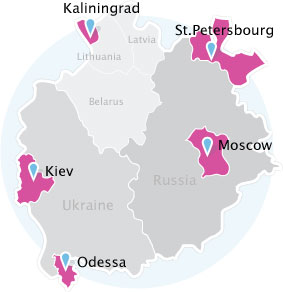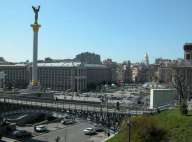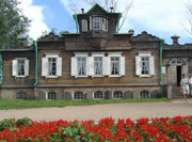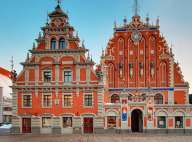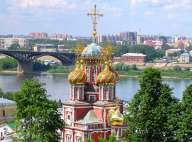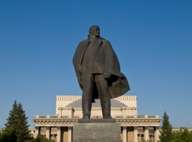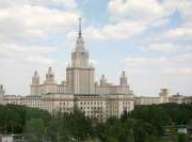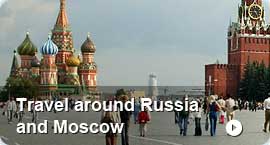Chemistry
Faculty of Chemistry
Dean: Corresponding Member of the Russian Academy of Sciences, Professor Valery V. Lunin
International Students Office: phone: +7-095-939-2175, fax: +7-095-932-8846
General Information
Courses in Chemistry started as early as 1755. Great Russian scientist Michail Lomonosov was one of the best chemists at his time. In 1755 he had organized the Laboratory of Chemistry at Moscow University which became the base of the Faculty of Chemistry.
Most of world recognized Russian chemists studied and then delivered lectures at our Faculty of Chemistry. 12 full members of Russian Academy of Sciences, 3 corresponding members and 180 professors holding PhD and Doctoral Degrees in Chemistry are now teaching a new generation of chemists to bring up high class specialists in modern Chemistry.
Research in all branches of modern chemical science is being carried out at our Faculty including studies on new semiconductors and high temperature superconductors, sophisticated synthesis of hundreds of new complex organic and organoelement compounds, new medicines, new polymers with liquid crystal properties. Scientists of the Faculty contributed a lot into the development of modern theory of Catalysis, Photochemistry, Electrochemistry and High Dispersion Systems.
Our scientists are accomplishing more than 200 projects in the frame work of Russian Foundation for Basic Researches. At present about 30 projects are successfully realized according the INTAS Programme.
Departments
- Analytical Chemistry
- Colloid Chemistry
- Laser Chemistry
- Inorganic Chemistry
- General Chemistry
- Organic Chemistry
- Radiochemistry
- Physical Chemistry
- Macromolecular Compounds
- High Pressures Chemistry and Physics
- Oil and Organic Catalysis Chemistry
- Natural Compounds Chemistry
- Chemical Kinetics
- Chemical Technology
- Chemical Enzymology
- Electrochemistry
- Naturаl Compounds Chemistry
- Chemical Kinetics
- Chemical Technology
- Chemical Enzymology
- Electrochemistry
Bachelour and Master Degrees
5 years full time
Direction: Chemistry
Programmes
- Physical Chemistry
- Inorganic Chemistry and Materials
- Analytical Chemistry and Radiochemistry
- Organic Chemistry
- Life and Polymer Science
General Courses
- Inorganic Chemistry
- Analytical Chemistry
- Organic Chemistry
- Physical Chemistry
- Crystal Chemistry
- Polymer Chemistry
- Colloid Chemistry
- Chemical Technology
- Structure of Molecules
- Environment Protection
- Mathematical Analysis
- Analytical Geometry and Linear Algebra
- Theory of Probabilities
- Equations of Mathematical Physics
- Computers and Programming
- Mechanics and Electricity
- Oscillation and Optics
- Theoretical Mechanics
- Principles of Quantum Mechanics
- Elements of Structure of Matter
- History and Methodology of Chemistry
- Special course in Humanities
- Philosophy
- Political Economy
- Foreign Language (Russian)
Half of this time (first 5 semesters) is taken by lectures and another half – by practical studies in chemical laboratories.
Courses on Speciality
Physical Chemistry
- Adsorption and Chromatography
- Catalysis and Gas Electrochemistry
- Kinetics and Catalysis
- Crystal Chemistry
- Molecular Spectroscopy
- Molecular Beams
- Solutions
- Stable Isotopes
- Structure and Quantum Chemistry
- Thermochemistry
- Chemical Cybernetics
- Thermodynamics
- Electronography
- Homogeneous and Heterogeneous Catalysis
- Flexible Catalytic Systems
- Photochemistry
- Low Temperature Chemistry
- Laser Photonics
- Double Layer and Electrochemical Kinetics
- Electrocatalysis and Corrosion
- Radiation Chemistry
- Electrochemical Energetic
- General Colloid Chemistry
- Physic Chemical Mechanics
Inorganic Chemistry and Materials
- Coordination Compounds
- Inorganic Synthesis
- Inorganic Crystalochemistry
- Semiconductors
- Superconductors
- Diagnostics of Inorganic Materials
- Safety of Technological Processes
- Technology of Inorganic Compounds
- Composite and Constructive Materials
- Metallochemistry
- Hydride, Ceramic and Carbonic Materials
- Power Consuming and Catalytically active Substances
Analytical Chemistry and Radiochemistry
- Kinetics
- Spectroscopic Methods of Analysis
- Chromatography and Electrochemical Methods
- Laser Induced Synthesis
- Laser Diagnostics and Spectroscopy
- Physic Chemical Analysis
- Environmental Chemistry
- Gamma-Resonance Spectroscopy
- Radioanalysis
- Radionuclides and Radiolabeled Compounds
Organic Chemistry
- Organoelement Compounds
- Physical organic Chemistry
- Organic Catalysis
- Organic Synthesis
- Biologically Active Organic Compounds
- NMR
- Organic Reagents
- Petrochemical Synthesis
- Catalytic Chemistry
Life and Polymer Science
- Proteins
- Chemistry of Nucleic Acids and Nucleotides
- Enzyme Engineering
- Kinetics and Mechanism of Enzymatic Catalysis
- Energy Bioconversion
- Micellar Enzymology
- Enzymatic Transformations
- Biotechnology
- Physical Methods of Polymer Investigation
- Polymer Structure
- Polyelectrolites and Biopolymers
- Synthesis and Chemical Transformations of Polymers
- Polymerization
Besides the basic curricula there are 5 special groups on: Physical (Theoretical) Chemistry, Radiochemistry and Radioecology, Chemistry of Polymers, High Temperature Superconductors and Computational Methods in Chemistry.
Master Degree
2 years full time
Direction: Chemistry
Programmes
- Physical Chemistry
- Inorganic Chemistry and materials
- Analytical Chemistry and radiochemistry
- Organic Chemistry
- Life and polymer science
Courses
Physical Chemistry
- Adsorption and Chromatography
- Catalysis and Gas Electrochemistry
- Kinetics and Catalysis
- Crystal Chemistry
- Molecular Spectroscopy
- Molecular Beams
- Solutions
- Stable Isotopes
- Structure and Quantum Chemistry
- Thermochemistry
- Chemical Cybernetics
- Thermodynamics
- Electronography
- Homogeneous and Heterogeneous Catalysis
- Flexible Catalytic Systems
- Photochemistry
- Low Temperature Chemistry
- Laser Photonics
- Double Layer and Electrochemical Kinetics
- Electrocatalysis and Corrosion
- Radiation Chemistry
- Electrochemical Energetic
- General Colloid Chemistry
- Physic Chemical Mechanics
Inorganic Chemistry and Materials
- Coordination Compounds
- Inorganic Synthesis
- Inorganic Crystalochemistry
- Semiconductors
- Superconductors
- Diagnostics of Inorganic Materials
- Safety of Technological Processes
- Technology of Inorganic Compounds
- Composite and Constructive Materials
- Metallochemistry
- Hydride, Ceramic and Carbonic Materials
- Power Consuming and Catalytically Active Substances
Analytical Chemistry and Radiochemistry
- Kinetic
- Spectroscopic Methods of Analysis
- Chromatography and Electrochemical Methods
- Laser Induced Synthesis
- Laser Diagnostics and Spectroscopy
- Physic Chemical Analysis
- Environmental Chemistry
- Gamma-Resonance Spectroscopy
- Radioanalysis
- Radionuclides and Radiolabeled Compounds
Organic Chemistry
- Organoelement Compounds
- Physical Organic Chemistry
- Organic Catalysis
- Organic Synthesis Biologically Active Organic Compounds
- NMR
- Organic Reagents
- Petrochemical Synthesis
- Catalytic Chemistry
Life and Polymer Science
- Proteins
- Chemistry of Nucleic Acids and Nucleotides
- Enzyme Engineering
- Kinetics and Mechanism of Enzymatic Catalysis
- Energy Bioconversion
- Micellar Enzymology
- Enzymatic Transformations
- Biotechnology
- Physical Methods of Polymer Investigation
- Polymer Structure
- Polyelectrolytes and Biopolymers
- Synthesis and Chemical Transformations of Polymers
- Polymerization
Training combines theoretical courses with practical and research work in the laboratories.
PhD Degree
3-4 years full time
Specialities
- Inorganic Chemistry
- Analytical Chemistry
- Organic Chemistry
- Physical Chemistry
- Electrochemistry
- Polymer Chemistry
- Chemistry of Organoelement Compounds
- Bioorganic Chemistry and Chemistry of Natural and Physiologically Active Compounds
- Colloid Chemistry
- Petrochemistry
- Radiochemistry
- Chemical Kinetics and Catalysis
- Chemistry and Technology of Compositional Materials
- Quantum Chemistry
- Chromatography
- Solid State Chemistry
- Biotechnology
- Biochemistry

